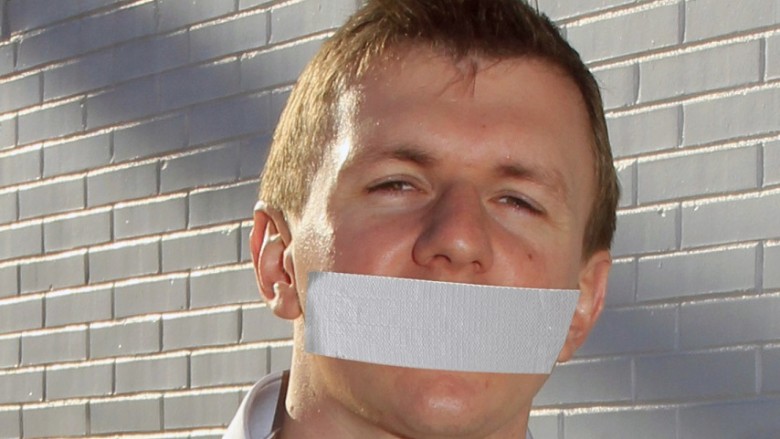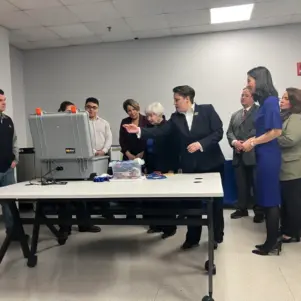Group that busted ACORN takes aim at Bay State
By Evan Lips | March 10, 2016, 17:23 EST
 James O’Keefe demonstrates the effect of Massachusetts law on his rights. (Photo courtesy of Project Veritas Action Fund
James O’Keefe demonstrates the effect of Massachusetts law on his rights. (Photo courtesy of Project Veritas Action Fund BOSTON – James O’Keefe, the conservative activist who founded the undercover journalism enterprise Project Veritas, which has embarrassed National Public Radio and led to the death of the ACORN community activist group, wants to bring his brand of exposé to the Bay State.
On Thursday, O’Keefe spoke at length about his Massachusetts ambitions. On March 4, his Project Veritas Action Fund sued in federal court to overturn what he described as the state’s “antiquated” and “detrimental” law that bans secretly recording what people say.
“Wasn’t Justice Louis Brandeis from Massachusetts?” O’Keefe pointed out. “Wasn’t he the one who said, ‘sunlight makes for the best disinfectant?’”
O’Keefe is hoping his organization’s lawsuit will prompt a federal judge to determine that the state law, Chapter 272, section 99, is unconstitutional. The law calls for fines of up to $10,000 and up to five years in prison for criminal violations.
“I could be charged with a crime,” O’Keefe said, should he use a concealed device to record a public official without his or her consent in Massachusetts. “Just for uncovering the truth, what politicians and people in power don’t want people to know.”
O’Keefe called Massachusetts “one of the worst” when it comes to protecting First Amendment rights. He noted that there is precedent on his side, recalling the successful appeal by a man who had originally been convicted of breaking state wiretap laws by secretly recording Boston University police during a 2007 political protest.
In that case, Simon Glik, a Russian immigrant, was arrested after using his cell phone to record officers arresting an activist on Boston Common. His case was later tossed, but Glik, a lawyer, sued. In 2011, a federal appeals court in Boston ruled that Glik had a right to record government officials in public.
The Massachusetts “Interception of wire and oral communications” law, according to the American Civil Liberties of Massachusetts, “prohibits willful interception – in secret – of any oral communication, without having obtained the prior authorization of those taking part.”
In commenting on the Glik case, the ACLU said a key distinction was that he wasn’t recording the activity secretly. In such cases, the ACLU said, the law does not require consent of all parties involved. But O’Keefe is challenging the consent requirement even for secret recording, which he argues is unconstitutional.
“I’ve been doing this for seven years and in that time we’ve brought about positive change,” O’Keefe added about his journalistic endeavors.
O’Keefe also said he’s had to fight back against a media narrative that suggests he deceptively edits his material to promote his agenda. He pointed to an incident in the ACORN case, in which he posed as a man looking for advice on running an illegal business, including how to smuggle underage girls as part of a sex trade operation. O’Keefe secretly filmed his interaction with a San Diego-based ACORN employee. O’Keefe’s video purportedly showed the man, Juan Carlos Vera, telling him how he had contacts across the border in Tijuana who could help.
Soon after the video’s release, ACORN fired Vera. Vera later sued O’Keefe, citing California recording laws. O’Keefe settled out of court with Vera for $100,000. On Thursday, O’Keefe criticized the media’s coverage of the story and said he’s had to demand retractions from hundreds of news outlets who reported that his settlement constituted an admission that he cast Vera in an unfair light.
“That wasn’t the case at all,” O’Keefe said, referring to allegations that he edited material to deceive viewers.
Then-California Attorney General Jerry Brown determined that although Vera appeared “sympathetic” to O’Keefe during their conversation, Vera later alerted police, according to RawStory.com. Brown also determined that O’Keefe’s videos were “significantly edited.”
According to California law, recording without consent is illegal “when there is an objectively reasonable expectation that the conversation is not being overheard or recorded.”
O’Keefe said he argued that the door to the room where his interaction with Vera took place was open but added that the court ruled against him.
The difference between the Massachusetts and California recording laws is subtle – the key factor, according O’Keefe, is the “reasonable expectation” qualifier that a conversation isn’t being overheard.
“The last videos were shot in California public places – bars and restaurants – we can’t even do that in Massachusetts,” O’Keefe added, referencing the string of videos his group began releasing in January that showed employees of textbook publishers talking about the Common Core national education standards, and how their implementation means big dollars for their companies.
One of O’Keefe’s most recent forays into New England occurred last month during the New Hampshire presidential primaries. According to the Reporters Committee for Freedom of the Press, Granite State law holds that “a journalist does not need consent to record conversations in public where there is no reasonable expectation of privacy.” In addition, violations are considered misdemeanors, not felonies.
O’Keefe’s organization managed to record poll workers offering instructions to would-be voters on how to take advantage of the state’s relaxed residency and same-day voter registration rules. Once posted on the Internet, the videos prompted the state attorney general to open an investigation.
This week, the New Hampshire House of Representatives passed a law requiring a 10-day residency requirement for anyone trying to register, according to New Hampshire Public Radio. The bill now heads to the state Senate. Last year, Democratic Gov. Maggie Hassan vetoed a 30-day residency requirement.
Passage of the bill in Concord caught O’Keefe’s attention:
Veritas gets results! #truth@Project_Veritashttps://t.co/lKnmXrzjPu
— James O’Keefe (@JamesOKeefeIII) March 10, 2016
On Thursday, O’Keefe said he’s prepared for a long court battle in Massachusetts.
“The current laws protect and indemnify the guilty,” O’Keefe said. “Our job is to shine the spotlight of truth to expose their dirty laundry.”











